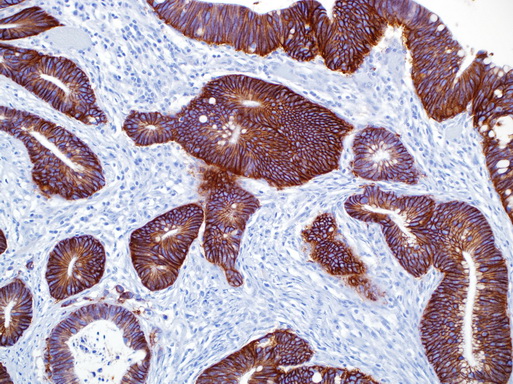EPCAM Mouse Monoclonal Antibody [Clone ID: Ber-EP4]
Other products for "EPCAM"
Specifications
| Product Data | |
| Clone Name | Ber-EP4 |
| Applications | IHC |
| Recommended Dilution | IHC: 1:50 - 1:200 |
| Reactivities | Human |
| Host | Mouse |
| Isotype | IgG1, kappa |
| Clonality | Monoclonal |
| Formulation | This antibody is supplied as cell culture supernatant diluted in tris buffered saline, pH 7.3-7.7, with 1% BSA and <0.1% sodium azide. |
| Conjugation | Unconjugated |
| Storage | Store at -20°C as received. |
| Stability | Stable for 12 months from date of receipt. |
| Gene Name | epithelial cell adhesion molecule |
| Database Link | |
| Synonyms | 4; DIAR5; EGP-2; EGP40; EGP314; ESA; HNPCC8; KS1; KSA; M4S1; MIC18; MK-1; TACSTD1; TROP1 |
| Note | Ep-CAM consists of two glycoproteins, 34 and 39 kDa, sometimes designated as epithelial antigen, epithelial specific antigen, or epithelial glycoprotein. In paraffin sections, the protein is detected with mouse anti-human antibodies like anti-Ber-EP4 and anti-MOC-31. The glycoproteins are located on the cell membrane surface and in the cytoplasm of virtually all epithelial cells with the exception of most squamous epithelia, hepatocytes, renal proximal tubular cells, gastric parietal cells, and myoepithelial cells. In liver lesions like hepatitis and cirrhosis, the hepatocytes frequently become anti-Ep-CAM positive. Normal mesothelial cells are anti-Ep-CAM negative, but may express focal reaction when undergoing reactive changes.Ep-CAM is found in the large majority of adenocarcinomas of most sites (50%-100% in various studies) as well as in neuroendocrine tumors, including small cell carcinoma. Renal cell carcinoma and hepatocellular carcinoma stain with anti-Ber-EP4 in about 30% of cases. Basal cell and basosquamous carcinoma are anti-Ber-EP4 positive in almost all cases. Malignant mesothelioma (epithelioid and biphasic) is anti-Ber-EP4 positive in 4%-26% of the cases. The staining is usually focal, but may occasionally be widespread. Synovial sarcoma (epithelioid and biphasic) and desmoplastic small round cell tumor stain with anti-Ber-EP4 in most cases. Seminoma, embryonal carcinoma, yolk sac tumor, and choriocarcinoma reveal anti-Ber-EP4 positivity in a minor proportion of cases. The lack of reactivity in the majority of malignant mesotheliomas can, in an appropriate panel, be utilized to discriminate between this tumor and adenocarcinoma. |
| Reference Data | |
| Protein Families | ES Cell Differentiation/IPS, Transmembrane |
Documents
| Product Manuals |
| FAQs |
{0} Product Review(s)
0 Product Review(s)
Submit review
Be the first one to submit a review
Product Citations
*Delivery time may vary from web posted schedule. Occasional delays may occur due to unforeseen
complexities in the preparation of your product. International customers may expect an additional 1-2 weeks
in shipping.






























































































































































































































































 Germany
Germany
 Japan
Japan
 United Kingdom
United Kingdom
 China
China



